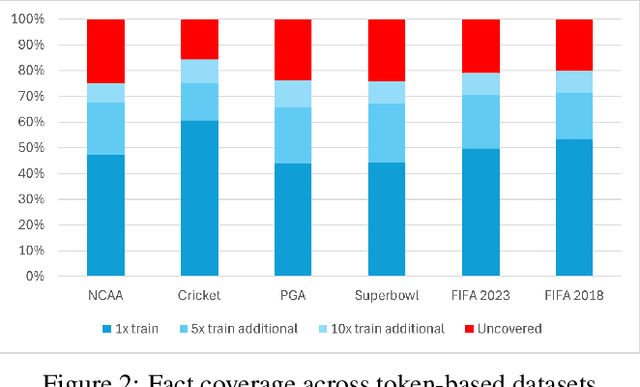Todd Hendry
Injecting New Knowledge into Large Language Models via Supervised Fine-Tuning
Apr 02, 2024



Abstract:In recent years, Large Language Models (LLMs) have shown remarkable performance in generating human-like text, proving to be a valuable asset across various applications. However, adapting these models to incorporate new, out-of-domain knowledge remains a challenge, particularly for facts and events that occur after the model's knowledge cutoff date. This paper investigates the effectiveness of Supervised Fine-Tuning (SFT) as a method for knowledge injection in LLMs, specifically focusing on the domain of recent sporting events. We compare different dataset generation strategies -- token-based and fact-based scaling -- to create training data that helps the model learn new information. Our experiments on GPT-4 demonstrate that while token-based scaling can lead to improvements in Q&A accuracy, it may not provide uniform coverage of new knowledge. Fact-based scaling, on the other hand, offers a more systematic approach to ensure even coverage across all facts. We present a novel dataset generation process that leads to more effective knowledge ingestion through SFT, and our results show considerable performance improvements in Q&A tasks related to out-of-domain knowledge. This study contributes to the understanding of domain adaptation for LLMs and highlights the potential of SFT in enhancing the factuality of LLM responses in specific knowledge domains.
RAG vs Fine-tuning: Pipelines, Tradeoffs, and a Case Study on Agriculture
Jan 30, 2024Abstract:There are two common ways in which developers are incorporating proprietary and domain-specific data when building applications of Large Language Models (LLMs): Retrieval-Augmented Generation (RAG) and Fine-Tuning. RAG augments the prompt with the external data, while fine-Tuning incorporates the additional knowledge into the model itself. However, the pros and cons of both approaches are not well understood. In this paper, we propose a pipeline for fine-tuning and RAG, and present the tradeoffs of both for multiple popular LLMs, including Llama2-13B, GPT-3.5, and GPT-4. Our pipeline consists of multiple stages, including extracting information from PDFs, generating questions and answers, using them for fine-tuning, and leveraging GPT-4 for evaluating the results. We propose metrics to assess the performance of different stages of the RAG and fine-Tuning pipeline. We conduct an in-depth study on an agricultural dataset. Agriculture as an industry has not seen much penetration of AI, and we study a potentially disruptive application - what if we could provide location-specific insights to a farmer? Our results show the effectiveness of our dataset generation pipeline in capturing geographic-specific knowledge, and the quantitative and qualitative benefits of RAG and fine-tuning. We see an accuracy increase of over 6 p.p. when fine-tuning the model and this is cumulative with RAG, which increases accuracy by 5 p.p. further. In one particular experiment, we also demonstrate that the fine-tuned model leverages information from across geographies to answer specific questions, increasing answer similarity from 47% to 72%. Overall, the results point to how systems built using LLMs can be adapted to respond and incorporate knowledge across a dimension that is critical for a specific industry, paving the way for further applications of LLMs in other industrial domains.
 Add to Chrome
Add to Chrome Add to Firefox
Add to Firefox Add to Edge
Add to Edge